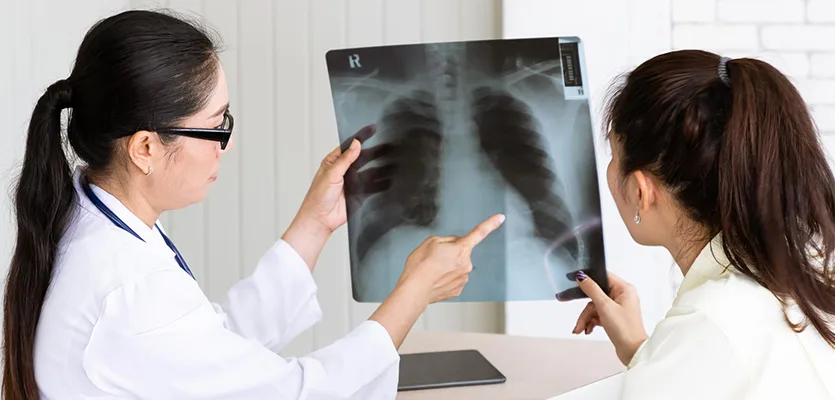Life after a lung transplant will change in innumerable ways, all to support your health and well-being. This is a quick reminder that a lung transplant is your protective shield, a second chance at life. But, in order to prolong their function, taking proper care and precautions after the lung transplant surgery is key.
Close and regular monitoring of one’s health after a lung transplant isn’t just a need but a necessity to avoid complications. Several things are at play, from managing the pulmonary function of the transplanted lungs to taking care of your diet and lifestyle. Can You Live A Normal Life After A Lung Transplant?
This article will explore life after a lung transplant and how you can maximize your survival rate with improved quality of life.
Events Right After the Surgery
Life after successful lung transplantation is heavily focused on recovery, maintenance, and monitoring of one’s health and well-being.
Here’s what you need to know:
Hospital Stay and Initial Recovery
Following the successful completion of the lung transplant, the patient is transferred to an ICU, where they are kept under close monitoring and observation.
You will remain attached to a ventilator during the first 1-2 weeks after the lung transplant to support your breathing until the implanted lungs are strong enough to function independently without any external support.
The duration of stay at the hospital following the lung transplantation will vary from one patient to the other. But you can be assured that your first phase of recovery after the surgery will be at the hospital. This includes 4-6 weeks of initial stay at the hospital, which has a sterile environment that reduces the risks of infections in the patient.
Pain Intensity
Lung transplantation is done under general anesthesia, so you will not experience any pain or discomfort during the surgery.
However, as you are transferred to the ICU, and the anesthesia starts wearing off, that’s when the pain might start setting in. However, pain management during the initial recovery is crucial to ensure that the patient is comfortable and does not experience any discomfort that could hinder their recovery.
Hence, pain management and strong immunosuppressants are administered intravenously to ensure that the body’s immune system doesn’t reject the transplanted lungs.
Eventually, the patient is weaned off the intravenous pain medications and switched to oral medications as they progress further into their recovery.
Preventing Complications
A patient’s life expectancy after a lung transplant depends on multiple factors. Monitoring and preventing post-surgical complications is key to a patient’s well-being.
Since the body is adjusting to an entirely new set of organs, paying close attention to any off-setting symptoms is important – both for the patient and the doctor.
To ensure that the body isn’t rejecting the transplanted lungs, we perform a thorough Lung Biopsy at Medanta a few weeks after the surgery. This determines how well the new lungs adjust inside the patients body and how their immune system reacts.
Even the slightest percentage of tissue rejection in the lung biopsy reports will warrant immediate medical intervention to reverse any potential damage.
The follow-up visits after a lung transplant will include a set of standard tests, including:
- Pulmonary function tests
- Blood tests
- Chest X-ray
- Bronchoscopy
The patient will remain on anti-rejection medications for a prolonged period after the lung transplantation surgery to ensure their body doesn’t become an antagonist for their new lungs.
However, immunosuppressants make the patient immunocompromised. Hence the risks of infections are quite high. Any signs of spiked fever chills, and swelling in the body warrant an immediate doctor’s appointment. How To Stay Healthy After Lung Transplant?
What are Some Lifestyle Changes after Lung Transplant?
It is not just the clinical and medical factors you must pay attention to after a lung transplant. Your body needs to adjust itself to lifestyle changes as well.
Right after the surgery, a tube is inserted into the patients throat to help them breathe. Hence, eating any food isn’t permissible during this period. The patient shifts to ice chips or clear liquids as the tube comes off.
The patient’s weight is crucial to recovery and life after a lung transplant surgery. A sudden spike in weight might indicate fluid retention in the body, which might need immediate medical attention.
Diet after a Lung Transplant
What you eat after a lung transplant makes a lot of difference. Since the patient is on multiple medications, experiencing an increased appetite is fairly common.
Also, some medicines might alter the blood glucose levels, and some might lead to fluid retention in the body – all of which are heavily influenced by the diet you consume after the surgery.
Some of the foods to eat after lung transplant:
- Bread
- Cereal
- Fruits
- Vegetables
- Milk and dairy products
- Meat and proteins
You need to strictly cut back on unhealthy fats, refined sugars, and excess salt from the diet. Raw foods in any form aren’t ideal for a lung transplant patient. Since fruit and vegetable skins are often high in fiber, it isn’t surprising that they must be peeled or cooked thoroughly to ensure easy digestion.
Sodium Intake
Also, restricted sodium intake after a lung transplant is a necessity. Patients are often on a medication called Prednisone, which retains water and sodium in the body, leading to swelling in the body’s extremities like feet, hands, ankles, etc. Adding extra sodium on top of that will further deteriorate the condition.
Fat Intake
A few medications prescribed after a lung transplant might cause high cholesterol levels in the blood. Augmenting that a high-fat and high-cholesterol diet can lead to risks of coronary artery disease or other heart-related complications. Even if you have a normal cholesterol level, limiting your consumption of deep-friend, junk, and processed food is ideal.
Further instructions about your dietary habits after a lung transplant is discussed in detail by our team of specialist doctors at Medanta. A thorough nutrition and diet chart is provided to ensure that the patient is eating right to support their recovery better.
Sleep Schedule After Lung Transplant
Besides your diet, how much sleep you get matters a lot. Experiencing a lack of quality sleep and risks of insomnia after a lung transplant is quite common.
The inability to sleep after a lung transplant is often a consequence of the following:
- After-effect of anesthesia
- Pain and discomfort from the incision
- Mental stress about the sudden change in the body
- Medicine side-effects
- If you aren’t able to get proper sleep, try out one of the following tips:
- Avoid unnecessary or extended napping during the day.
- Sleep on comfortable pillows and in a colder room to allow your body to adjust to the surroundings.
- If you are anxious or stressed about your health, discuss the concerns with a therapist, friends, and family.
- Practice meditation or other relaxation techniques to help you sleep.
How to Maintain Weight after Lung Transplant?
One of the reasons why you need to pay attention to foods to avoid after a lung transplant is to prevent unnecessary weight gain.
Complications of weight gain and high cholesterol levels are bad omens for lung transplant patients. A few medications for lung transplant patients might lead to fluid retention and increased appetite. It is common and something we discuss at length with our patients at Medanta.
Watching your weight after lung transplantation is crucial to your overall well-being. It ensures you won’t compromise your pulmonary function and activity levels with the new lungs.
Some of the top tips for managing weight with lung transplantation are:
- Avoid foods that are rich in unhealthy fats and calories
- Include high-fiber foods like whole grains, fruits, vegetables, etc.
- If you notice a rapid weight gain, discuss the same with your transplant team to see if you have fluid retention in the body.
- Indulge in leading an active lifestyle instead of being lazy around the house.
When Can One Resume Normal Activities?
Recovery after lung transplantation can take months. So, resuming normal activities will depend on how you feel at that moment. Many transplant patients wait for 4-8 weeks or until their incision has healed before planning a return to their normal schedule.
At Medanta, we offer our patients to undergo a daily pulmonary rehabilitation program to help strengthen their lungs and physical health daily. Irrespective of how you define “resuming normal activities,” certain things are entirely off the chart.
These include:
- Avoid heavy lifting of items over 5 pounds.
- Avoid driving for up to 6 weeks at least.
- Introduce a gradual increase in the intensity of physical activities.
- Rough contact sports are off the chart to ensure the lungs aren’t injured.
- Avoid smoking of any kind in and out of the house. Avoid risks of secondary smoking too.
- Prioritize any odd symptoms and get immediate medical attention if needed.
Conclusion
A patient’s life after a lung transplant surgery change drastically – all for the better. Not only do you get a second chance at life, but you also get to live your life without restrictions, which wasn’t possible with your diseased lungs.
With such a blessing, taking care of yourself is necessary if you wish to ensure a prolonged life expectancy after the surgery. This article explores every last detail about your lifestyle, dietary and clinical changes after lung transplantation.
At Medanta, we offer comprehensive and tailored lung transplantation treatment. For further details, visit drarvindkumar.com

.webp)



